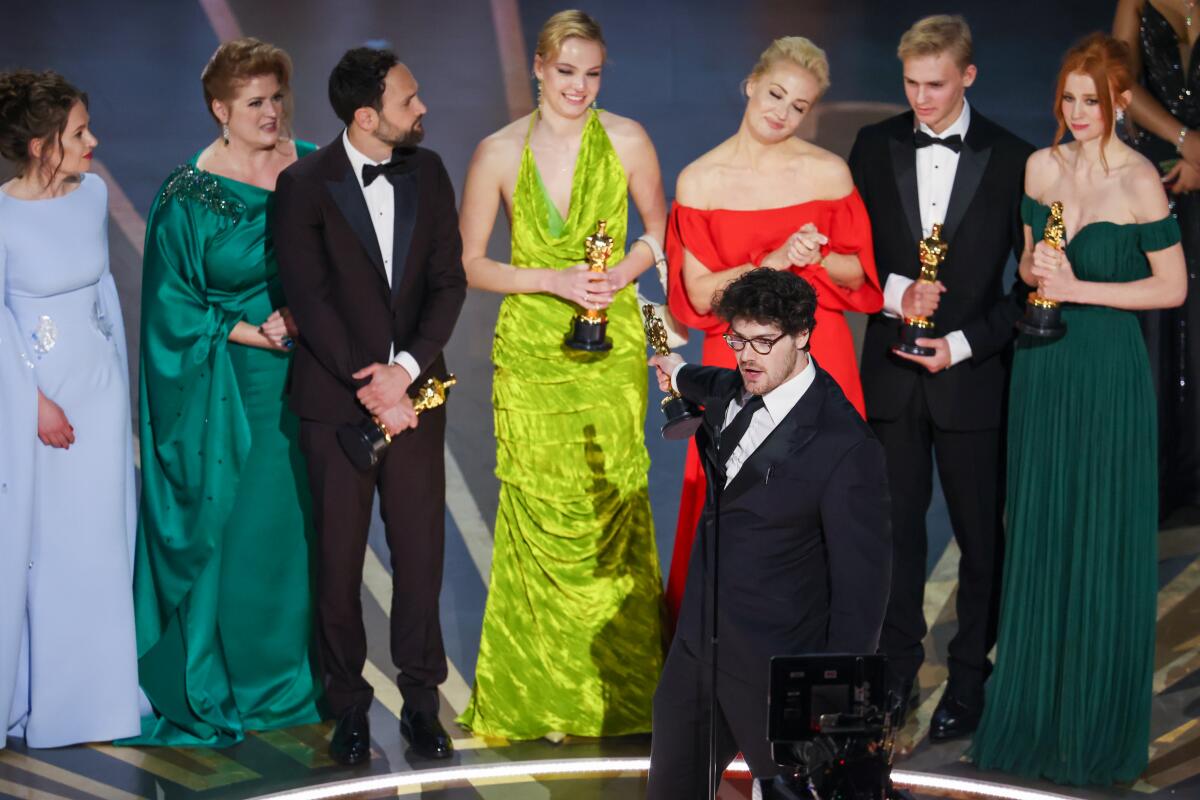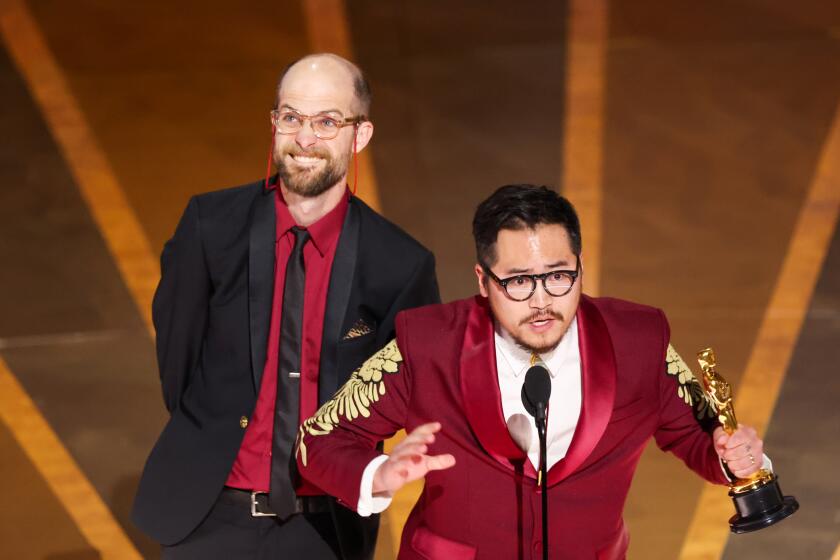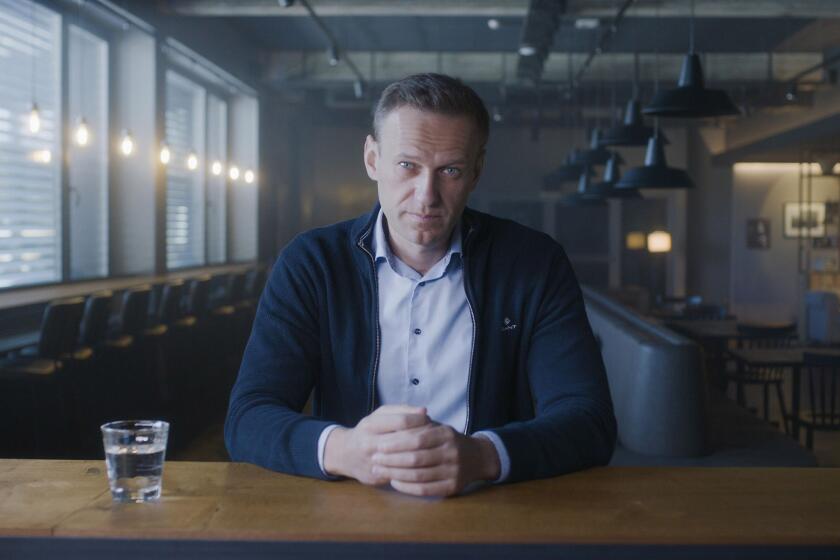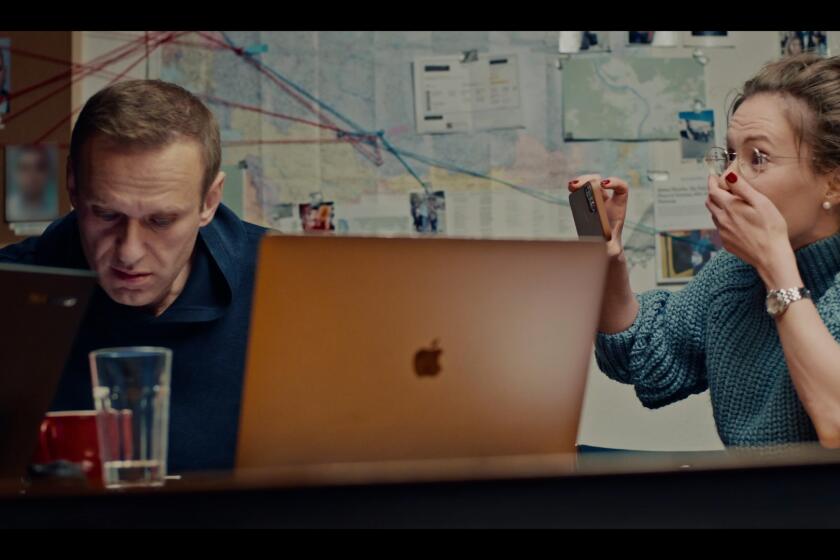‘Navalny’ wins the Oscar, and director Daniel Roher blasts Putin and the war in Ukraine

- Share via
Daniel Roher just knocked Putin off his high horse, dedicating his Oscar to political prisoners around the world.
On Sunday night, after winning the Oscar for documentary feature for “Navalny,” director Daniel Roher used his acceptance speech to blast Russian President Vladimir Putin: “And there’s one person who couldn’t be here with us here tonight ... Alexei Navalny, the leader of the Russian opposition, remains in solitary confinement for what he calls ‘Vladimir Putin’s unjust war of aggression in Ukraine.’
“Alexei, the world has not forgotten your vital message to us all. We cannot, we must not be afraid to oppose dictators and authoritarianism. Wherever it rears its head,” Roher said at this year’s 95th Academy Awards, which Jimmy Kimmel hosted live from Hollywood’s Dolby Theatre.
Yulia Navalnaya, Navalny’s wife, who also is featured in the documentary, attended the Oscars in her husband’s place, along with their children, Dasha and Zahar. She joined Roher onstage and gave an emotional speech.
“My husband is in prison, just for telling the truth. My husband is in prison, just for defending democracy,” she said. “Alexei, I am dreaming of the day when you will be free, and our country will be free. Stay strong, my love.”
The 2023 Oscar winners include “Everything Everywhere All at Once,” Brendan Fraser, Michelle Yeoh and “All Quiet on the Western Front.”
The Times caught up with Roher before the ceremony and he shared that he never could have anticipated the timeliness of “Navalny.”
“We thought that our film was prescient to begin with but we never could have imagined how significant and timely our film would be. I think our film is a precursor in a way to this brutal war [in Ukraine.]”
“As a filmmaker it’s the distinguished honor of my life [to be nominated], but I’m not just here as a regular filmmaker, I’m here as the sort of brand ambassador of Alexei Navalny,” Roher continued. “I’m here because Alexei Navalny right now is languishing in a gulag six and a half hours outside of Moscow and I want to remind the world that he is there, remind the world that a brighter future for Russia is possible, and as Navalny asks his supporters: You have to have hope. Because if you don’t have hope, then your future is guaranteed to be bleak and dark.”
Other nominees for documentary feature on Sunday included “All the Beauty and the Bloodshed,” “All That Breathes,” “Fire of Love” and “A House Made of Splinters.”
“Navalny” chronicles the investigation into the near-fatal poisoning of Russian opposition leader Alexei Navalny. The lawyer and activist was vocal about the Kremlin’s corruption, wouldn’t give up the fight for democratic reform, and was poised and ready to challenge Putin for the Russian presidency.
Daniel Roher’s Sundance prize-winning documentary reopens the investigation into the 2020 poisoning of Alexei Navalny.
In August 2020, Navalny was poisoned by a Novichok nerve agent during a hotel stay. The documentary was filmed while he recovered in Berlin.
Navalny suspected the Kremlin was responsible for the poisoning that nearly killed him, and he, Bulgarian journalist Christo Grozev and Russian activist Maria Pevchikh set out to prove it through a series of investigations depicted in the film.
The bombshell moment that made “Navalny” so electrifying was when the prominent critic of Putin decided to call the men involved in his assassination attempt to confront them. The men promptly hung up, so Navalny switched to a savvier approach — he impersonated a Kremlin functionary asking for a report as to why the poisoning failed.
Alexei Navalny and his colleagues, charged with extremism for supporting democracy, continue to investigate Putin’s corruption
In January 2021, Navalny returned to Moscow, and the cameras captured the crowd of supporters awaiting his return and the moment he was detained by police, which prompted widespread protests across Russia. He reportedly was transferred within the past year to a maximum-security IK-6 prison in the Vladimir region village of Melekhovo, approximately 155 miles east of Moscow.
Shortly after the film’s premiere, Russia invaded Ukraine.
“It’s my hope that Navalny, through the film, is able to remind the world that an alternative vision for what Russia can be is possible,” Roher told The Times in November, “... but ultimately, I hope the film helps to keep Navalny alive.”
More to Read
From the Oscars to the Emmys.
Get the Envelope newsletter for exclusive awards season coverage, behind-the-scenes stories from the Envelope podcast and columnist Glenn Whipp’s must-read analysis.
You may occasionally receive promotional content from the Los Angeles Times.













